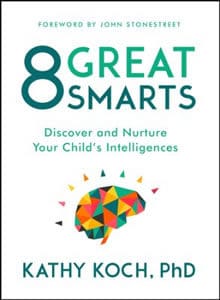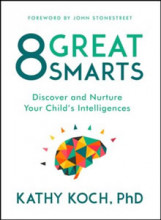
The War of Words
In this Adventures in Odyssey drama, a carelessly uttered word from Eugene creates havoc as it becomes the fashionable insult, resulting in a lesson about the power of words.
Home » Episodes » Focus on the Family Broadcast » Intelligence: Discovering Your Child’s Unique Gifts (Part 2 of 2)
Excerpt:
Dr. Kathy Koch: I’ve had picture-smart and music-smart children say to me, “Dr. Kathy, I knew I was talented and creative and artistic, but I didn’t know I was smart. I thought my brother was the smart one.”
Jim Daly: Huh.
Kathy: Jim, it changes their whole perspective on the giftings and on their tomorrows.
End of Excerpt
John Fuller: A great observation from our guest on the last Focus on the Family radio program. That’s Dr. Kathy Koch and she’s back again to share more insights on what she calls the multiple intelligences that we all have. I’m John Fuller and your host is Focus president and author, Jim Daly.
Jim: John, Dr. Kathy Koch, she shared some really remarkable material last time as we looked at the eight different types of smarts. That’s an easier way to say what you just said and, uh, that’s the title of her book, 8 Great Smarts and we’re gonna cover more of that today. If you missed the program last time, I’d encourage you to get the CD, get the download. Um, get it on your smartphone. That’s an easy way to listen to Focus on the Family. Just get the app and you can hear it on your own time and at your own pleasure. But I am really thrilled to have Kathy back on the program today.
John: And she is a very popular speaker. She’s an author. She’s written a number of books and, Jim, pretty much every time we have Dr. Koch here, we have a lot of response from listeners who are saying, “That really, uh, was something I could take and apply in my own parenting situation right today.”
Jim: It’s true and I think it’s because her heart is so big for children. And you know what? We Christians parents, our hearts are big for our kids, too. And what Kathy does so wonderfully, is she opens up our understanding of how God has wired us, our personality, our giftedness, our talent. And you know, as parents, sometimes it can irritate us to see kids acting in different ways from us and we’re gonna give you tools today to calm down, recognize this genius in your children and let it blossom. Kathy, welcome back to Focus.
Kathy: Thank you. I’m thrilled to be here.
Jim: Ah, hey, we were talking last time about the eight types. We kinda went through them real quickly. Um, we covered body smart and we did that one pretty well. Let’s turn to the other seven now. Let’s start with school smarts. I think you defined it as word and logic. Um, I know as a father of two teenagers, word and logic seems to be not part of the vocabulary.
(LAUGHTER)
Jim: So, what do I gotta do?
Kathy: Yeah, first let me say that, the reason I call those “school smarts” is that we talk, read, listen, write and ask and answer questions all day long in school. And so, children who have more brain cells for these two smarts will find school a friendlier, easier, more successful place to be. And yet, all of us know people who were very successful in school and are flunking life.
Jim: And vice versa.
Kathy: And vice versa, which is evidence that all eight matter. So, if you want to raise, um, “good kids,” kids who enjoy life, kids who embrace life, kids who have a successful life, make sure that you awaken, strengthen, focus and train all eight. And yet, I understand the heart of the dad and the mom this time of the year in particular, possibly is that school smart focus of word and logic. So, we need to help them with the vocabulary. We need to help them with how to ask good questions; how to answer questions thoroughly; the difference between why and how; the difference between describe and defend; or the difference between judge and evaluate; or the difference between compare and contrast, because those will be essay words used in our junior highs, middle schools and high school. And what if kids don’t know those vocabulary words? Then they don’t do as well.
Jim: Well, and you know, Kathy, the system is pretty much set up for people with word and logic smarts – school smarts as you call them. Um, how do we beat the rigging of the system for our kids, be advocates for our children who maybe struggle in that area? They’re not stupid kids.
Kathy: No.
Jim: I don’t even know if there is such a thing as a stupid child.
Kathy: No.
Jim: Um, we need to allow them to blossom and to move in a – maybe in a more fruitful way. But how do we help our children overcome the system?
Kathy: If your children have teachers who go out of their way to teach eclectically, with a variety of methods and a variety of assessment options, say thank you, thank you and thank you again, because it’s really hard work. Because the system may be flawed toward the word and logic. So, I praise God for teachers who get this and understand that we’ve gotta give kids a chance to prove that they know it and that they’re well off in school.
Jim: Even if they take a different path getting to the knowledge.
Kathy: Absolutely, my friend. And we can teach the – you know, kids who aren’t very logic smart for instance will really struggle with vocabulary possibly if they’re not very word and logic, but what if they’re very picture smart? We can let them draw the definition. What if we have these kids draw an apartment building, a condo, a house, a ranch-style home, a factory? What if we have them draw a cul-de-sac, a highway, a street, right? And we prove through the drawing that they understand the differences. What if we could correct that and say that was well done? And parents can help kids study at home with those smarts that they have more brain cells in. Even if they go back to school on Tuesday and take a written vocabulary test, your son who is picture smart, when having to write out the definition of an apartment building, will remember, oh, wait, I drew that taller and wider, with all kinds of windows. That’s the building that a lot of people live in, in independent units and they pay rent to somebody. That will work for these kids.
Jim: I mean, that’s unbelievable and I – I’ve not experienced that, ‘cause I don’t believe, uh, I’ve hit that as a parent. How about you, John? Have you?
John: Uh, as you’re talking, Dr. Koch, I’m thinking about, uh, my youngest, who is pretty word smart, but he memorizes by looking at the list. Uh, we’ll be going through schoolwork this past, last school year. We’re checking Latin and so, he’s – he wants to know the order that they’re all in…
Kathy: Hmm.
John: …Cause he’s got it figured out. There are pictures of the words in his mind of what that, uh, study list is. So, I think you’re onto to something that just, uh, might help me there.
Kathy: That’s great. And here’s another one. What if the kid isn’t very word, but is very music? How do we spell Mississippi?
Jim: Yeah, with a tune.
Kathy: M-I-S-S-I-S-S-I-P-P-I. And you will never not know that. The ABC’s, the books of the Bible in order by songs.
Jim: (Laughing)
Kathy: Music is very powerful for long-term memory, so if you’re parenting a child without a lot of word and logic and is struggling with math facts and spelling and the order of events for history tests, they can put it to song and they’ll take that test and hum the song and they’ll do much better. That’s effective. And even if a teacher doesn’t understand this and doesn’t assign that, when parents and grandparents teach this to their children, children can go off into their room and they can make up a song, because they’ve been empowered to be smart the way that they are created to be smart.
Jim: It’s – I laughed because I’m thinking of how many times in my 20’s and 30’s, people would say, “Which comes first, the Q or an R?” And I’d start, (singing) A, B, C, D…”
(LAUGHTER)
Kathy: Exactly.
Jim: And that – that’s how much rhythm is in that.
Kathy: Sure.
Jim: Hey, the other thing that I love about the book and we’re gonna continue into the other, uh, traits, the other smarts, but is this idea of character challenges…
Kathy: Hmm.
Jim: …You might have with that particular bent or that particular smart. So, with the school-smart child, what are those, um, character challenges that you might find?
Kathy: Great question. You know, those of us who are word smart, we can gossip, tease, name call.
Jim: So, you use words to destroy.
Kathy: Exactly, we use a gift from God for harm. We, um – we always want to have the last word. Or we could impress someone with our vocabulary. So, anything well done, badly done, is not well done, we need to be really careful of that. Um, the logic smart kids, one of the strengths that we have when we’re logic smart is solving problems. But guess what? We can also create problems for other people to solve if we’re logic smart. We can often figure out how to get into trouble and not get caught…
Jim: Oh.
Kathy: …Because we’re logical and we think ahead, and we reason our way towards something.
Jim: So, for that parent that has that child – I mean and I would think these are the honor roll kids for the most part.
Kathy: Mm hmm.
Jim: You know, you put the bumper sticker on…
Kathy: Yeah.
Jim: …And we’re really praising their academic ability, their verbal ability, their vocabulary. But there is that danger they will either become or maybe already are verbal attackers.
How do we recognize the gift and then say, “But Johnny…”? “But Mary, here’s what you gotta do with other people that maybe struggle here”? Play that our for us. What does that parent do to recognize they’ve got brilliance in a certain area, but at the same time, it comes with a weakness?
Kathy: Mm hmm. This is why I wrote in the book so much about developing the character, developing the heart along with the mind. And what’s very interesting, Jim and John, about school smart kids, if I can call them that – those who find school easier to be – they sometimes don’t feel they need character. They don’t need to learn to persevere. They don’t need to be diligent. They don’t need to be teachable and to ask for help, because it all comes easily to them. And then the day that they’re struck by something that’s challenging and difficult and now they feel stupid all of a sudden and they don’t know how to handle it and that’s when the misbehavior will often ramp up, because of the stress that’s internally within. So, if you are raising these kids who find school a safer place to be, you must establish the dialogue about character immediately when they’re young, so that they don’t put all of their eggs in the basket of brain…
Jim: Right.
Kathy: …’Cause one day they may not feel as smart as they are feeling today. They’re gonna find out somebody is smarter and then they’re gonna want to be egotistical and prideful and competitive and judgmental and you’re not gonna want that kid. So, we talk about character the whole time. And then as a parent, when you see a child tease or gossip or name call or – or argue, which is logic and word together – we – we call sin “sin,” but we call strength “strength,” okay? And we look at them, especially if we’ve taught them this, and we say, “Elizabeth, you’re proving again how word smart you’ve been created to be, but sweetheart, you’re not using your words well.”
Jim: Hmm.
Kathy: “Think about it, sweetheart. We’re talking to you about self-control and self-respect and living in community and – and giving life to your brother and sister. You’re not doing that today and we’re disappointed. Now we don’t want you to stop talking, ‘cause it’s a gift, but you’ve gotta learn how to use y our words well.” We have those conversations.
John: But – but there are parents who are saying, “Oh, I’ve had that conversation…”
Kathy: Oh, no.
(LAUGHTER)Jim: Well, I was gonna say…
John: And over and…
Jim: …Timing…
John: …Over and over again.
Jim: Yeah, timing is another thing. You can – parents can get weary of saying, this is what, you know, being verbally positive means for your word-smart child.
Kathy: Mm hmm.
Jim: When can – don’t stop investing in that area, right? Because 13, 14, they may – they hear you, but they may not, um, deploy the advice, but it doesn’t mean it’s lost.
Kathy: Absolutely. And children tell me all the time they want parents to speak life over them. A lot of kids are not gonna come and say, “Daddy, what do you think of this?” They’re just not unfortunately, but they still care, even though their behavior may not indicate it.
Jim: It’s more…
Kathy: They still …
Jim: …Passive.
Kathy: Absolutely. But they still value your opinion. They still want to know. Remember what my parents did? They enrolled me in children’s theater. They wanted me exposed to other children like me, using the gift in a healthy way. So, that’s another thing to consider. Mentors. Who do you know who’s a lawyer, who’s a politician, who’s a great expositor of Scripture, who you have over for dinner to talk to your son about the positive use of this logic smart, word smart argumentative brain you have?
Jim: Hmm.
Kathy: How do you use that to solve problems? How do you use it to research and to…? You might be the one that creates the tool we need to solve a real issue, but we – we don’t want to paralyze him. We don’t want you rejected by your peer group, because you’re so verbose. You know, we have to learn. I’ve had to learn to listen.
Jim: (Laughter).
Kathy: Those of us who have a lot of word smart and logic smart gifts, tend to not like small talk. So, I can be out with friends and I consider that we’re having small talk and I’m thinking of a powerful question to ask so we can get a bit more serious. I’ve had to learn to not ask it all the time.
Jim: Hmm.
Kathy: To honor my friends and to just have fun and to talk about things that aren’t all that significant. But there’s joy there.
Jim: Yeah.
Kathy: And I choose to go there. Now I’ve had to learn to do that and I’ve watched other people and I’ve learned to receive the modeling and – and be able to have a healthier attitude.
Jim: Well, and that sounds like where Paul writes about being content in all things.
Kathy: Hmm.
Jim: I mean, you’re sitting at that table. That – that applies. Paul…
Kathy: Hmm. Good point.
Jim: …Is saying, “Yeah. Be content with the people around you and listen.” And I – I like that. You touched on picture smart. Let’s most to that one, so we can get through, uh, the items here. But picture smart, um, I think I may have one child that does that. He’s very good at art. I don’t know that, that necessarily connects it, but…
Kathy: Mm hmm.
Jim: …Is a typically a good artist as a child someone who is picture oriented?
Kathy: Yes. See, that’s interesting, Jim, because the smarts never work alone. So, someone who is body smart thinks by movement and touch and has good control of their hand-eye coordination and is also picture smart, will often be able to build with clay…
Jim: Huh.
Kathy: …And maybe watercolor well. Somebody who’s just picture smart and isn’t as body smart would never do the clay or the crafting.
Jim: Interesting.
Kathy: Okay, so there is art as a component. The other thing that shows up for picture smart kids, who think with their eyes and pictures, would be fiction and history, because they read it and they see it. Or they hear a lecture and they see it and it gives life to that subject matter.
Jim: So, for that picture-smart child, who really sees the world that way and communicates that way, what would be some of their potential character issues?
Kathy: Judging a book by its cover, meaning judging a person by appearance. Their eyes are very powerful. They observe and they think.
Jim: So, non-verbal inputs are maybe weighted too heavily for them?
Kathy: Excellent. And I’m not saying it’s irrelevant. I love that you said, “too heavily,” ‘cause it’s not irrelevant, but they would be quick to judge based on what they see. Pornography…
Jim: Hmm. Wow.
Kathy: …Is a huge sin obviously. It’s so sad, isn’t it, how many young children and people…
Jim: Yeah.
Kathy: …Find that? And what’s really tragic is that picture-smart children who find it will find it very appealing. Videogames that might be very dramatic and violent might actually be very appealing to the picture smart child, because the eyes matter so much. And once they’ve seen it, they have a very hard time not seeing it.
Jim: Oh, that’s interesting.
Kathy: And the tragedy with pornography, if I can go there, is I’ve met with people who haven’t actively sought porn for a very long time, but can still see what they saw and still feel like they’re sinning.
Jim: So, that would be a picture smart person.
Kathy: Oh, very much and this is why we have to help our children guard their eyes with the right boundaries. And you have to be the kind of parents who they can come to and say, “Daddy, I saw something.”
Jim: Hmm.
Kathy: I have tears in my eyes because it’s not their fault that they were attracted to that, because if you’re picture smart, you think in pictures. Your eyes are your power, not your ears and not your mouth and it’s attractive. And young children who don’t know it’s sin yet, right?
Jim: Yeah, but what a great context to have that parent-child discussion.
Kathy: In fact, when we say, this is why this is attractive, this is why – however you want to word it, it’s like Satan has you stuck here. This is why this is your sin issue, because the devil wants to take your strength and damage them and destroy them, diminish them and say to you, you are bad. And you are not bad…
Jim: Wow.
Kathy: …Because you are picture smart and creative and imaginative and you see things. You are smart in a unique way, but you must be careful and let me help you.
Jim: Hmm.
John: Well, that, uh – that should speak to the heart of every parent listening right now and, uh, that is from her heart, Dr. Kathy Koch. And, uh, you’re listening to Focus on the Family with Jim Daly. You can find out more about Dr. Koch, her book, 8 Great Smarts, a CD or download or our mobile app so you can listen to us again. All of that information and lots of parenting helps at focusonthefamily.com/broadcast.
Jim: Kathy, let me – let me ask you this. Um, we’ve covered a handful of these now and music smart to me (chuckling) is a no-brainer, especially for a teenager. It seems like all teenagers are music smart beyond their parents’ ability. What’s happening there? Why is music smart, um, a gift? Many of us parents might think it’s not so much a gift.
Kathy: Great question again. I think it’s been awakened earlier, because music is everywhere, on apps that buzz and be-bop, on videogames and websites and just the – the…
Jim: It’s pervasive.
Kathy: …Music. It is pervasive and so, their ease of access would activate that part of the brain earlier and cause children to gravitate there. What I think is happening, Jim, is there’s a lot of interest. There’s not necessarily a lot of ability. Intelligences always start with interest. They will only be flamed into or fanned into abilities when the interest is affirmed when the children are maybe given private lessons. They’re taken to concerts. They’re, um, introduced again, to mentors, possibly who sing well or – or use music to edify the Lord. So, it’s a powerful, powerful thing. I’m actually very concerned about children who idolize music, who idolize musicians, who think it’s easy, who are allowed to keep pods in their ears and ignore the people. And that would be a very negative attribute. I’m very music smart. I went to the university I went to march in the band. I have no music on my phone, because I know my boundaries and I don’t want to go there. I – I don’t put pods…
Jim: Oh, interesting.
Kathy: I don’t put pods in my ear. In airports and airplanes, nowhere. My choice. I’m not saying that that’s right for everyone, but I want to invest in people.
Jim: That’s really fascinating. You know, and I – when I was a teenager in high school, I never listened to music. It didn’t’ appeal to me. In college I never listened. Uh, but now I listen to more Christian music – a lot of Christian music and I enjoy it. Third Day is a great…
Kathy: Mm hmm.
Jim: …Band that I like. And, uh, but back when I was a kid, I could care less. I was into sports and school.
Kathy: Mm hmm.
Jim: And I – you know, I would actually look down a little bit on people that were so into music that they – they couldn’t do other things.
Kathy: What’s interesting about that is, it’s proof that the brain can be awakened at any time. So, I believe your boys awakened more of that music smart in you.
Jim: Oh, that could be.
Kathy: Raising boys. They’re older. They’re teenagers. They’re into music. They’re coming to you and saying, “Dad, do you like this song?” And so, by choice, to interact with, to engage, to connect, to be empowered with your boys, God used them to awaken that part of your brain. And now you enjoy music often.
Jim: Yeah, you know, Kathy, um, last time we were together, you talked about the science behind this and, uh, I want to make a comment here that I think you would agree with. There’s research out there in academic circles where the brain is pliable at an early age. 6 to 12 I think is kind of the range where if you don’t get exposure to tone and foreign language, you actually will struggle as an older child after 12-years-old, to gain a sense of tone and to be able to do foreign language more easily. Is that – am I hearing that correctly when I read that literature? Is it that short a period of time that the human brain – I mean, it begins to harden, as I remember reading the literature, that your brain is pliable and at about age 12, it begins to harden literally.
Kathy: It does. We – we have until age 25 for total brain development, which is either really encouraging or really discouraging.
(LAUGHTER)
Jim: Depends on the day.
Kathy: Depends on the age of your kids.
John: How old are your children?
Jim: Right.
Kathy: So, if you have a 25-and-a-half-year-old, you’re really sad right now.
Jim: But that’s fascinating.
Kathy: it is fascinating. This is why we should never give up. But the thing that’s so cool is, that for young children, you’re correct. They have an easier time with learning different things, because their brain is more pliable and habits haven’t been set in and they haven’t received messages from the culture that have said, “You can’t do that.”
Jim: Well, we even say, that kid is soaking up stuff like a sponge.
Kathy: Mm. Right.
Jim: We have it – we say that.
Kathy: We do. The good news is, that the brain is pliable and can be developed through effort. It will take more effort and perseverance as you age, but it’s still possible. And I think if we’re motivated because of the connection factor, we’ll be able to do it.
Jim: Kathy, last time we covered body smart and again, if you missed it, get the download. But we didn’t touch on the character challenges of a body smart child. So, what would the – the character challenges be for that kinetic body smart child, who’s moving a lot and learns by being active?
Kathy: Touching everything, even though they’ve been told not to.
Jim: (Laughter) Oh, man.
Kathy: Um, touching sisters. You know, touching everything in the museum. Um, and kicking and punching and forcing their way to the front of the line, because they can make their body do that.
Jim: Okay.
Kathy: Using their body as their power.
Jim: Forcefulness.
Kathy: Forcefulness.
Jim: And then self smart. How about self smart?
Kathy: Self-smart kids crave quiet and peace and do a lot of thinking alone. They become very opinionated, because they’ve thought deeply about things. So…
Jim: Deeper than anybody else.
Kathy: Yes.
Jim: So, they can be a little egotistical about that as well?
Kathy: Egotistical. The lack of teachability, pride in their thoughts. Now all of us – pride can enter into all of these, but for the self smart mind, it is often that they don’t share. Their opinions matter and they can become bossy and argumentative in that regard, especially if they’re also logic and word smart.
Jim: Right. And, uh, people smart. You have that one. People smart’s interesting. What – what is that?
Kathy: You know, people smart people think well with other people, but they also have an ability to read body language. So, we’re the ones who can determine if you’re mad, happy, sad or glad.
Jim: Without a word.
Kathy: Without a word, so we walk toward a dad to ask for a favor and you have “No” written all over your body and so, we turn around.
Jim: Right.
Kathy: And then the dad is like, “Can I help you?” And the kid is like, “No, ‘cause I want you to say ‘yes’ and you’re going to say ‘no.’” So, we have a strength to observe and respond appropriately, but that also means we have the ability to manipulate you and or to motivate. So, the strength would be to motivate and to see you sad and to love on you or to see you frazzled and take advantage of that by knowing that you’re weak. And so, we’d get you to do something that otherwise you wouldn’t have done. And so, that’s a negative use of that people smart ability.
Jim: So, that’s people smart. That combination of things, let’s touch on that, um, because you’re right in saying that you’re not one thing, you know. This isn’t a personality profile test. You – you’ve got all of this. It’s a matter of developing it. Can a person actually be really smart in all eight smarts?
Kathy: Absolutely. I think if you’re raised eclectically, the earlier they’re awakened, the greater the likelihood they’re a strength for a lifetime. If you parent well when children are young, they’ll have a greater aptitude for all eight. And then if they’ve been exposed to a variety of people and a variety of experiences, variety of toys, a variety of books, all of that matters in the awakening process. So, yes, it’s possible. It’s not necessary though, so I don’t want anyone to listen and go, “I have to go and get smarter in this way.” Be who you’ve been created to be and accept who you are. I think that’s really important.
Jim: What about the parents who are saying, “Wow! Okay, my kids now are 15, 16, 17…” And you’re going, I had no clue this is how it was all working. Now it’s making sense to me. My – why my people smart child has been demonstrating this behavior his or her entire life. How do they back up and connect with that more thoughtful, almost adult-oriented older child now to say, “Hey, let’s talk about this. This is fascinating what I heard today on Focus on the Family”?
Kathy: That’s exactly what I would love for them to do, to be mature and to treat the child as more mature and to have the respectful conversation. “I’ve learned something about you. I’d love to share it.” Because what we’re giving people today is powerful language to explain what they’ve observed for years.
Jim: Well, you counsel these kids.
Kathy: Mm hmm.
Jim: What do they say to you when you open this window for them and they go, “Ah, now I know why I am the way I am?”
Kathy: I’ve had pictures mart and music smart children say to me, “Dr. Kathy, I knew I was talented and creative and artistic, but I didn’t know I was smart. I thought my brother was the smart one.”
Jim: Huh.
Kathy: Jim, it changes their whole perspective on the giftings and on their tomorrows. I’ve had people smart children raise their hand to say, “I can make my dad say ‘yes,’ when he should’ve said ‘no.’” And then I say, “Don’t ever be proud of that again.” And there’s whoom, instant silence and then there’s tears, as they recognize that a strength has been used in a negative way.
Jim: Wow.
Kathy: I’ve had self smart children and self smart moms and dads come to me and go, “Now I understand why I have to isolate sometimes. I’m not lonely. I’m not alone. I’m not bad. I’m not negative. I’m self smart and I need time and it is okay. I no longer feel like I’m a slow thinker. I’m a reflective person.” Identity controls behavior and language is powerful and this gives life to people. That’s why I’m so grateful to be here.
Jim: Kathy, we’re right at the forefront of a new school year. It’s leaning toward that logic smart, word smart child. You might have a child that’s not as well developed in that area. In a few weeks now, they may not do that well on an exam. You’re gonna start to worry. They got the D, maybe the F and you’re panicking, and you start putting pressure on that child. “Come on. You gotta study more.” I mean, I’m speaking a bit of experience here. How do we embrace that child for how God has made them, not let them get away with being lazy, but how do we balance all that?
Kathy: It’s a great question, because that’s the question of the age. I know when I do this in a live training, that’s why they come. We need to accept them for who they are and know that they’re not stupid. They’re smart differently. We need to believe that they can become smarter in word and logic. If your kid is in the type of a school where it’s a very word and logic smart school, get the book and support Focus on the Family and read those chapters and look for my ideas about how to help them study. Jim, don’t tell them to study. Help them study.
Jim: Oh.
Kathy: You know, buy the magnetic letters for the refrigerator and let them make their spelling words there. Let them do things creatively and differently at the same time that you say, “Look, you’re music smart. Let’s put it to a rhythm.” “Hey, you’re people smart. I know that, ‘cause I listened to this broadcast. It was revolutionary. You’re people smart. Come study with me. Ask me questions. Let’s talk together about it and learn together.”
And I need to say that if you want your kids to accept who they are, you have to accept who they are. You have to. They’re God’s creative miracle, uniquely designed with His intentionality. And it’s not always easy, but let me remind you of something we said in the first broadcast and that is, you can do really well in school and not do really well in life. And that’s not what we want for our kids. We want them to do well in school and well in life, so all eight matter.
Jim: (Chuckling) That’s well said. Dr. Kathy Koch, 8 Great Smarts: Discover and Nurture Your Child’s Intelligences. This has been really good, and I hope you will contact us to get a copy of the book and for a gift of any amount, help us put this resource into the hands of people who can’t afford it by supporting the ministry. Uh, send a gift of any amount. Request the book and we want to say thank you in that way by giving you this book when you help us. So, do it today. We need your help. People need your help.
John: And you can donate and find Kathy’s book and other helpful resources at focusonthefamily.com/broadcast. Or when you call 800, the letter A and the word FAMILY. 800-232-6459.
Jim: Kathy, this has been so good. Man, Jean and I are gonna read this and we’re gonna have the kids read it, too. And, uh, I just want to say thanks for being with us.
Kathy: It’s been a joy and an honor and let me suggest that parents buy copies of the book for grandparents, for the teachers of their children. What better way than to help the people who have authority over your children understand them better?
Jim: That’s a great idea.
Kathy: And a – and a great way to support Focus. We – we’ve gotta be on your side in that way.
Jim: Well, thanks again for being here.
Kathy: My pleasure.
John: On behalf of Jim Daly and the entire team, thanks for listening to Focus on the Family. I’m John Fuller, hoping you have a great weekend and inviting you back on Monday as we once more help you and your family thrive in Christ.

Dr. Kathy Koch is the founder and president of Celebrate Kids, Inc., an organization dedicated to helping parents and educators understand and meet the needs of today’s children, and a co-founder of Ignite the Family: A Movement of Awakened Parents. She is also an international speaker and the author of several books including Screens and Teens, No More Perfect Kids and How Am I Smart? Dr. Koch earned her Ph.D. in reading and educational psychology from Purdue University. She resides in Ft. Worth, TX. Learn more about Dr. Koch at www.celebratekids.com.

Receive Kathy Koch's book 8 Great Smarts for your donation of any amount!

Check out our podcast series designed to help you give your children what they need to thrive during this school year.

Visit our online store and purchase a CD of today's program for yourself or to share with a friend.

Summarizing the eight facets of human intelligence, this helpful chart can help parents quickly identify their child's gifting.

The school choice that we make for our children can have a significant impact on their desire to learn, as well as, having an impact on their future personal growth and success.

Dr. Kathy Koch offers practical advice for finding wholeness, contentment, and peace in a discussion based on her book Five to Thrive: How to Determine if Your Core Needs are Being Met (and What to Do When They're Not). (Part 1 of 2)

Would you like more meaningful connection with your teens? Kathy Koch shares why it's important to spend face-to-face time with your teens, outside of screen time.

Every day our children need courage to stand up for what is right and make good choices. We need to discover how to encourage them to help them be more successful.

Dr. Kathy Koch offers practical advice for how you can teach your children positive character traits and strengthen your relationship with them in the process. (Part 1 of 2)

The school year is all about routines and schedules. And after a summer of fun in the sun, the transition can be difficult. While change always provides challenges, there are things we can do to ease into the new school year.

Dr. Kathy Koch offers parents helpful insights and advice from her book, Screens and Teens: Connecting With Our Kids in a Wireless World. (Part 1 of 2)

In a discussion based on her book Screens and Teens, Dr. Kathy Koch offers parents practical advice for strengthening their relationship with their teenagers by helping them navigate the pitfalls of technology. (Part 1 of 2)

In this Adventures in Odyssey drama, a carelessly uttered word from Eugene creates havoc as it becomes the fashionable insult, resulting in a lesson about the power of words.

This discussion offers a preview of Volume #16 “Cultures in Conflict” from the That The World May Know video series, available below.

Debra Fileta will help couples better understand the four seasons of healthy relationships, what to expect during each one, and how to carefully navigate them for a stronger marriage. (Part 1 of 2)

Larnelle Harris shares stories about how God redeemed the dysfunctional past of his parents, the many African-American teachers who sacrificed their time and energy to give young men like himself a better future, and how his faithfulness to godly principles gave him greater opportunities and career success than anything else.

Amy Carroll shares how her perfectionism led to her being discontent in her marriage for over a decade, how she learned to find value in who Christ is, not in what she does, and practical ways everyone can accept the messiness of marriage and of life.

Psychologist Dr. Kelly Flanagan discusses the origins of shame, the search for self-worth in all the wrong places, and the importance of extending grace to ourselves. He also explains how parents can help their kids find their own sense of self-worth, belonging and purpose.